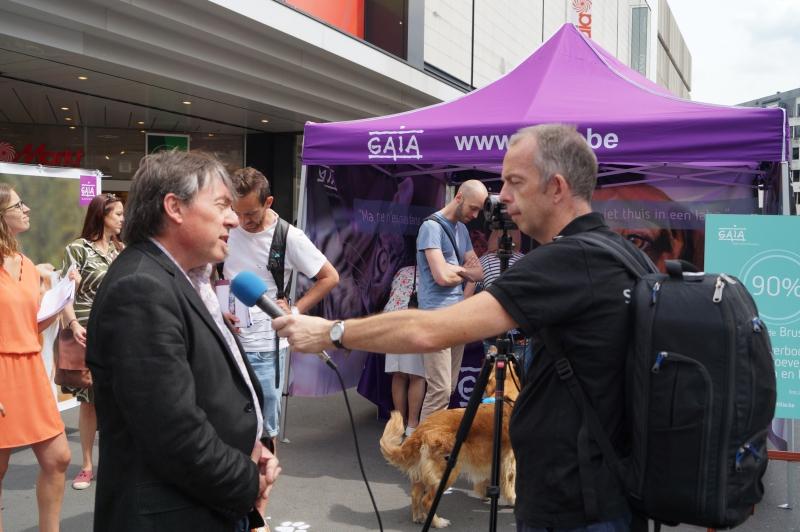
"Pootitie/Pattition" at the heart of GAIA’s Summer Tour unites humans and their best friends against the use of dogs and cats as lab animals
Tuesday 26th July marked the official launch in Brussels, of GAIA’s annual Summer Tour, this year dedicated to the fight against testing on dogs and cats. GAIA’s Tour will continue until August 11th, during which a team from the animal rights organization will stop in major Belgian cities to inform and gather public support against the use of dogs and cats in painful experiments carried out in Belgian laboratories. The results of a recent survey conducted by Ipsos at the request of GAIA revealed that 85% of the Belgian population supports a ban on testing on dogs and cats. “GAIA asks the Ministers of Animal Welfare to abolish tests on dogs and cats, or at the very least to establish a concrete and effective strategy to gradually reduce these tests to zero in Belgium,” says Michel Vandenbosch, President of GAIA. “The goal of our campaign is to end testing on dogs and cats - sensitive and vulnerable animals - which are obviously incapable of giving their consent, and with whom Belgians share a very strong bond.”
Detailed by region and province, the results of the recent IPSOS survey revealed that:
- 85% of respondents in Belgium agreed that tests on dogs (89% in Brussels, 81% in Flanders and 93% in Wallonia) and cats (91% in Brussels, 79% in Flanders and 93% in Wallonia) should be banned.
- There is greater awareness of these tests in Flanders than in Wallonia and Brussels, included in a range from 49 to 69% and from 33 to 46%, respectively, in these regions.
- 77% of all Belgians, all regions included, believe that laboratory animals must be put up for adoption.
- Nearly 4 out of 10 Belgians stated they would be willing to adopt a laboratory dog or cat, knowing that these animals would have special care requirements (40% in Brussels, 33% in Flanders and 37.5% in Wallonia).
- Finally, as to the question of whether the respondents would be willing to let their pet be used in an experiment if their animal was already suffering from an incurable disease (such as cat AIDS) hoping that it could benefit their animal or others, 67% in Brussels, 61% in Flanders and 56% in Wallonia said yes.
GAIA’s Summer Tour
Armed with paper forms and tablets, a team of staff and volunteers from GAIA approached passersby, of both the two-legged and four-legged variety, to ask if they would sign the "Pootitie/Pattition" calling for a ban on testing on dogs and cats. This petition, the first of its kind, in fact makes it possible to collect signatures from our furry four-legged friends as well as their caretakers. The dogs were also welcome.
Among the signatories of the "Pootitie/Pattition" are the French journalist and writer committed to animal rights, Aymeric Caron, Walloon Minister for Animal Welfare, Carlo Di Antonio, actor Pol Goossen and his dog Wap, TV presenter Chris Dusauchoit and his dog Mona, TV celebrity Lesley-Ann Poppe and her dog Coco, Flemish writer Herman Brusselmans and his dog Eddie and actress Loes Van Den Heuvel and her dog Lila.
Official numbers
According to official statistics, 1,578 dogs and 120 cats were used in scientific experiments in Belgium in 2014. Broken down by region, 8 dogs were used in Brussels, 1,539 dogs and 90 cats in Flanders and 31 dogs and 30 cats in Wallonia.
The hidden reality
Michel Vandenbosch condemns the blatant lack of transparency and reliability of information made public by researchers: “In the present circumstances, it is clear that laboratories take special care not to disclose accurate information on the nature of their experiments on dogs and cats and other animals.” He added: "Some researchers certainly underestimate the degree of pain and suffering inflicted on laboratory animals. In addition, the origin of the animals, the degree of their suffering, or the goal of experiments are often extremely vague and poorly informed. Researchers are more concerned with obtaining greater freedom for their experiments, often complaining that they already endure too many constraints imposed by current legislation. Nevertheless, the current legislation intended to protect laboratory animals has largely been written to serve the interests of those who conduct such tests”.
Daily suffering
During these tests, cats and dogs are subjected to various procedures: injections, punctures, catheter insertions, electric shock, administration of drugs, surgical operations, infliction of injuries and other interventions that are obviously far from harmless. “Given the lack of transparency and reliable information from researchers, and the intense suffering generated without consent of the animals concerned, GAIA believes that experiments on dogs and cats should be abolished,” says Michel Vandenbosch.
GAIA points out that although it is opposed to research on healthy dogs and cats, which are deliberately made ill or mutilated (or poisoned, in the case of toxicity tests), it sees no objection to some kinds of research in the interest of cats and dogs already suffering from disease.
